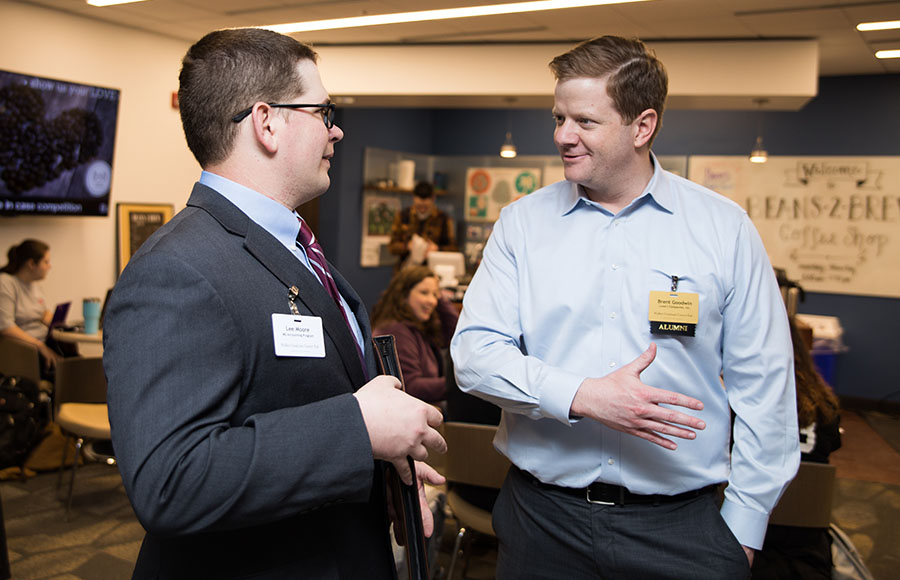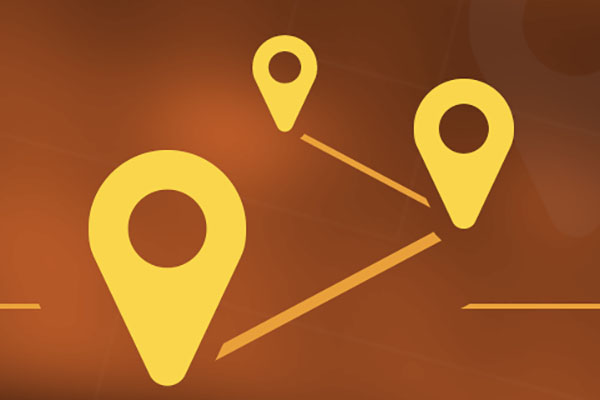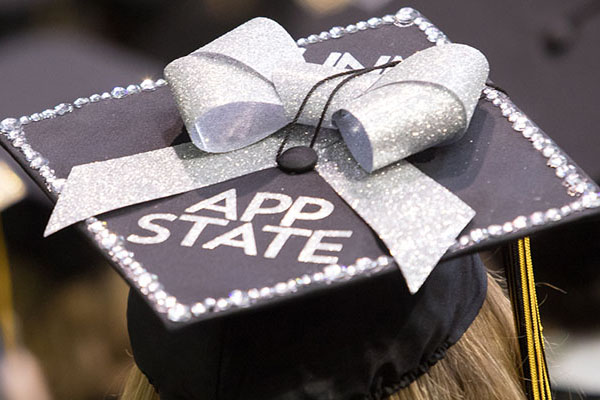
Brent Goodwin ’03, senior director of business analytics for Lowe’s Companies Inc., right, speaks with Appalachian alumnus Robert Lee Moore ’17 ’18, then a graduate student in Appalachian’s M.S. in accounting program, during the 2018 Walker College of Business Graduate Career Fair. The majority of employers who recruit at Appalachian are alumni — a testament to the lifelong connection the university nurtures with its graduates. Photo by Chase Reynolds
BOONE, N.C. — The resources available through Appalachian State University’s Career Development Center (CDC) empower students to take charge of their future and continue their success long after they’ve crossed the graduation stage.
“Appalachian prepares students for careers, not just the first job,” said Dr. Susan McCracken, Appalachian’s director of career development and economic engagement. “Career development is identity development. Having a career is doing meaningful work.”
McCracken and her CDC team are redefining the way students think about the career readiness process and encouraging students to start their journey as soon as they arrive at Appalachian.
“It is critical to get students to recognize early on the need to develop a strategy for how they will attain and demonstrate the competencies that broadly prepare them for a successful transition into the workplace,” said Jennifer Shaffer, associate director of employee relations and marketing in the CDC.
The focus of the CDC is to help students achieve three broad milestones:
- Finding their value and how they want to impact others.
- Exploring interests that align to their values, such as majors, industries, jobs and cities where they might want to live after graduating.
- Gaining professional experiences.
To foster one-on-one engagement and aid in identifying a student’s values and interests, each career counselor supports a specific college at Appalachian. The counselors are available to meet with students and discuss anything from resumes and interview skills to developing a digital identity and practicing their elevator pitch.
Individual career counseling appointments can also focus on how to translate experiential learning, like volunteer and community work, into the desired skills and competencies sought by employers. On average, 90% of Appalachian students report their career counseling appointment helped them with their specific need, according to post-appointment surveys conducted during the 2018–19 academic year.
The CDC also offers ongoing events related to writing resumes and cover letters and identifying internships. Signature events organized by the center include the annual Internship and Job Fair, Careers for Impact symposium, Graduate and Professional School Fair, and Talent Jam.
Professional experiences gained through student employment are a top priority for Appalachian. An average of 4,500 students are employed on Appalachian’s campus each year, and the CDC works to map job descriptions to career competencies.
The result? Experiences that yield transferrable skills — skills that prepare students for the challenges and opportunities they will find in the workplace and in life.
Additionally, on average, 80% of students self-report they’ve completed an internship either on or off campus. Internships create opportunities for students to demonstrate their skills, expand their competencies and network among industry professionals while still in school — all of which are invaluable when it comes time to apply for jobs.
What do you think?
Share your feedback on this story.
Appalachian tracks where its graduates go, notes high success rate
About the Career Development Center
The Career Development Center at Appalachian State University supports the mission of the university and its Division of Student Affairs in developing lifelong learners and leaders by engaging and challenging students within a culture of care and inclusion. Students who participate in the center’s services are able to identify core values, beliefs and skills and use them to articulate relatable career goals; acquire transferable skills and relevant experiences for future professional endeavors; and utilize resources that are available to gain experiential learning opportunities and cultivate professional networks. Learn more at https://careers.appstate.edu.
About Student Affairs at App State
Student Affairs at App State supports student success and well-being by fostering a culture of care, inclusion and engagement. Its mission is to develop lifelong learners and dynamic leaders through meaningful experiences that challenge and support students. Grounded in a commitment to care, engage and transform, Student Affairs creates a student-centered environment that encourages resilience, leadership, service and global learning. Student Affairs encompasses the following units: Campus Activities, Case Management, the Child Development Center, Community-Engaged Leadership, Counseling and Psychological Services, Office of the Dean of Students, New Mountaineer and Family Engagement, Off-Campus Student Services, Plemmons Student Union, Student Conduct, M.S. Shook Student Health Service, Student Legal Services, Student Veteran Services, University Recreation, and Wellness and Prevention Services. Learn more at https://studentaffairs.appstate.edu.
About Appalachian State University
As a premier public institution, Appalachian State University prepares students to lead purposeful lives. App State is one of 17 campuses in the University of North Carolina System, with a national reputation for innovative teaching and opening access to a high-quality, cost-effective education. The university enrolls more than 21,000 students, has a low student-to-faculty ratio and offers more than 150 undergraduate and 80 graduate majors at its Boone and Hickory campuses and through App State Online. Learn more at https://www.appstate.edu.
















